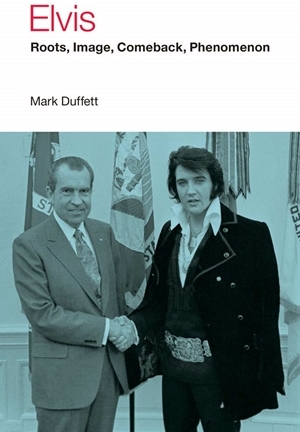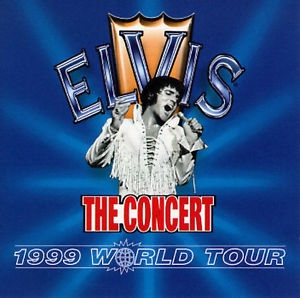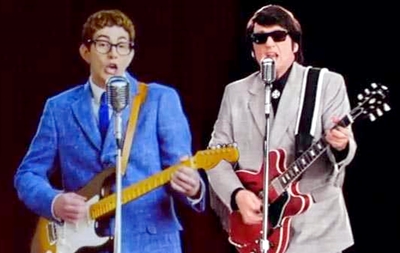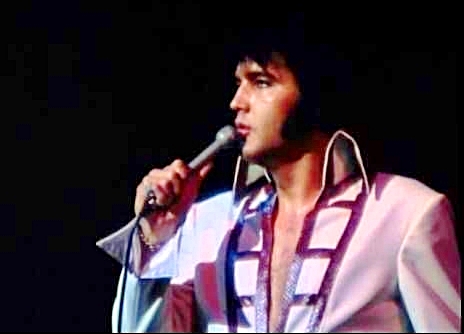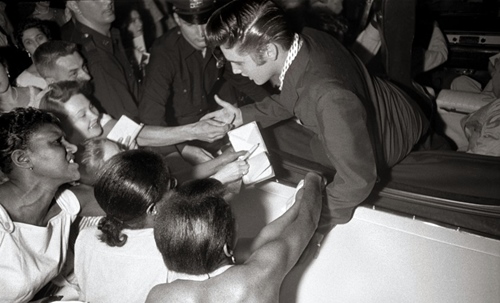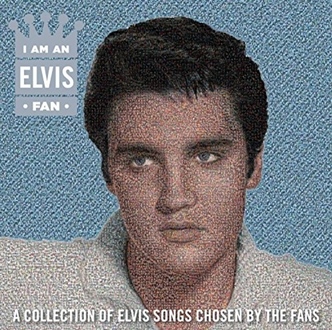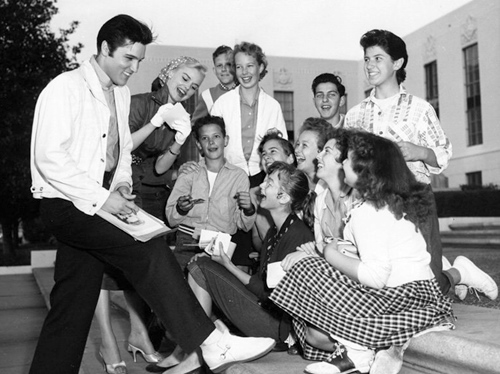 |
 |

INTERVIEW EIN’s Nigel Patterson recently sat down with Dr. Mark Duffett via the face-to-face magic of Google Hangouts, to discuss Mark’s latest book, Elvis Roots, Image, Comeback, Phenomenon.
Part 2 EIN: Mark, the body of academic work around Elvis has grown steadily since the late 1980s and there appears to be a wider appreciation within academic circles of Elvis’ importance. However, there does not seem to be much change at the media and public level about how he is regarded. What is your view on this issue? MD: That’s an interesting question. My first thought is that I see it the other way around, that his image has changed significantly with the public, but not so much with academia. EIN might have a different perspective and that will be interesting to know. I think that with his public acceptance……if you go back to the 80’s and 90’s there were efforts to make Elvis part of the cultural heritage, the wallpaper of American history, if you like. And those efforts were quite heavily resisted. There was a kind of kooky image of Elvis and his fans that was quite negative. And there had been the disputes between the Elvis estate and RCA which meant his music was less heard, and that was problematic. But then you had the Guralnick biographies, you had the estate RCA issues mended. That brought us to the late 1990s and into the 2000’s with Elvis the Concert – Elvis on the big screen, which then became Elvis with the Philharmonic Orchestra. So if anything, I think Elvis’ public image was being rescued by those things, and when you look at some of the other things with celebrities coming unstuck and celebrity deaths…. I think Elvis’ story was more recognisable and understandable as the tragedy that happens to many celebrities, but in his case to a more extreme degree.
I am perhaps the exception, in that I don’t know of any other researchers who have spent 20 years or so maintaining an interest in Elvis. I think Michael Bertrand would be another exception. He is a very able researcher and has published some strong work. For various reasons my generation of researchers didn’t get Elvis. Thankfully, though, there is a new generation of researchers coming through. For instance, Bertel Nygaard in Denmark and Mathias Haeussler in Germany, who are both historians and starting to do Elvis research. I am hoping that as the Elvis story gets more back in time, more researchers will become interested and try to situate him in his era of the Cold War and the fifties, sixties and seventies. I think that research has the potential to be more positive and interesting and I am looking forward to that work. Mathias has his book, Inventing Elvis: An American Icon in a Cold War World, being published in December and Bertel has written many papers about Elvis’ reception in Europe. [EIN Note: see our news items dated 29 Aug 2020] EIN: I understand what you are saying about the academic research around Elvis tending to be a bit narrow in some areas, but I don’t fully agree with you that academic interest hasn’t grown. I think back to the First Elvis Presley Conference hosted by Vernon Chadwick during one of the early Elvis Weeks, and in the early 2000’s the First Online Elvis Presley Symposium that EIN was heavily involved with. It had a strong mix of academic and non-academic (fan) contributions. There have also many Elvis music related courses at universities around the world from the UK and US to Australia and Germany. The Australian courses have involved a course on Elvis’ films at the Canberra College, the University of the Third Age ran a very successful course for several years, as did tertiary institutions in Sydney and Melbourne. Even the Australian National University Film Group screened Flaming Star and discussed Elvis as a folk hero. Admittedly, many have been run to a small number of participants and in recent times they do appear to have declined in number, and yes they haven’t led to much research. But can’t we say that of most popular music artists? MD: You are right, there have been quite a few,. I went to one in 1997. And Peter Nazareth also comes to mind as having run one. However, my view is that they haven’t led to very much research. In comparison, Beatles or Dylan studies have a niche of dedicated researchers. EIN: The Beatles and Dylan have the advantage that they wrote their songs, which opens up their work to detailed analysis of their songs. MD: Yes, that’s true.
Technology is always changing. For instance, this year, with the pandemic, we have had a virtual Elvis Week. And I think as new technologies develop, there will be expectations that Elvis will be propagated in those. We haven’t yet had a full scale hologram tour as far as I know, but who knows, in the future…… perhaps they could test the waters with a Barbra Streisand in Las Vegas hologram (laughing).
MD: That may be the case. From what I saw of the Roy Orbison hologram concert on YouTube he looked like a very good Big O impersonator. I actually found it quite spooky, but Roy could be quite spooky. I think with Elvis… and I went to the first Elvis the Concert show in the UK in 1997, they had an Elvis impersonator for the fifties Elvis (given the paucity of good audio-visual material of Elvis in the 50’s), and Elvis on the big screen for the seventies. Yes, the dynamism of Elvis in the fifties may present a major challenge, but the way they’ve gotten around that is to get an Elvis tribute artist in to do the body movements which can be digitally translated onto the screen as Elvis. So there are all these things they can do…it’s quite astounding. So the technology is one dimension that situates Elvis in 2020. The second element is the fan culture and the fans being of different generations. I think there is a degree of family propagation going on from parent to child in the love of Elvis. Not for all fans but there is certainly a degree of that happening. And another area that we haven’t done enough research on is what is called “bereavement fandom”. This is where, for example, a family member dies and you inherit their record collection and start to understand Elvis through the record collection. Obviously given the age of many Elvis fans this is a factor that is growing. So we need more research on that kind of thing. I remember something Greil Marcus wrote, that “We always thought Elvis was immortal but that his fans weren’t”. The out take from this is that perhaps the Elvis phenomenon will die out because there are less fans. Having said that, his estate is still so active and so strong, and will be a major force in perpetuating his legacy for some time yet. Of course, we have to wonder how far into the future it can last. What happens when Priscilla dies, etc? But that is a way off and I think there will be a major impetus with the 50th anniversary. The third element is simply the ideas, the foundation upon which Elvis’ celebrity image and celebrity can exist. It’s hard to see just what those are until people start to lose interest and the phenomenon starts to wane. There’s not much I can really say about this but one thing of interest to me is that at the moment we are experiencing serious issues around race. In the Trump era we’re seeing a deliberate effort to separate Black Americans from the white middle class. And the interesting thing to me about Elvis is that he didn’t do that.
So I think this is one of the things that might work against Elvis as in each era we get the Elvis we deserve because of the racial politics of the era, for instance, whether it is driven by segregation or assimilation. And those can depend on a whole range of political, economic and social factors. I am somewhat uncomfortable about the recent “Trumpification” of Elvis and Elvis fandom with posts on Twitter saying “I support Trump and Elvis is a patriot”. I am interested in the Elvis of In The Ghetto and If I Can Dream and the Elvis of the fifties which showed politics through entertainment. EIN: The points you make are very important and well made. Even though Elvis probably leaned towards the Republican Party, he was a very fair and non-racist person who hated inequality. His breaking segregation lines in Memphis in the 1950s and his reaction to the death of Martin Luther King are good examples of this. I think if he was still alive today he would be more attuned to the racial tensions than some of his fans appear to be. To me there is a dissonance between how Elvis behaved and what he believed and how some of his fans behave and what they believe. MD: It is a very interesting area and one open to vigorous debate. I think, and this is something seen somewhat disparagingly today, that Elvis was a colour-blind musician and person. In terms of the popularity of Trump, it is interesting that Trump agreed to award Elvis the Congressional Medal of Freedom. What is also interesting is that apparently it was Todd Slaughter’s British Fan Club that made the request. Billy Smith, Elvis’ cousin, said something very interesting about it. He said “What other president would have considered giving it to Elvis?” And when you think about it, Bill Clinton played Heartbreak Hotel on his saxophone on the Arsenio Hall show. So are they all using Elvis for their own reasons? In my view it is a politics thing, but at least there is a recognition of the white working class. That group of people have felt roundly ignored by the American political process, and to some degree that is true. The political fault line seems to be racialized increasingly at the moment, and that is wrong. I don’t know if you are aware of Tim Wise. He is a white race activist in America and what he does in talking about race issues is somewhat like what Elvis did in the 50’s through entertainment. I think that if they both existed today Elvis would be seen as a white ally. And that sort of language probably wouldn’t have been appropriate to think about or talk about in the 50’s.
EIN: Mark, thank you. That is a very interesting and important issue you have highlighted. Returning to your written works, have you any plans for another Elvis book? EIN: Are the contributors all academics, or will there be fan perspectives? MD: No, all contributors are academics. That was the requirement from Oxford University Press. EIN: The reason I asked was….I don’t know if you are familiar with, I mentioned it earlier, the first, and I think, only, online symposium around Elvis circa 2004-05. The contributors were a mix of academic, non-academics (fans), and music critics, and it worked very well.. The range of contributions was interesting. It comprised everything from a fan written poem to academic research, a market research content analysis of media headlines at the time of Elvis’ death, and everything in-between. MD: I am not familiar with the Symposium but maybe we should arrange another one as that could be a really interesting event, and one that might take us forward in our knowledge and understanding of Elvis. One thing I’ve realised is that there is such a wide variation of perspectives and interests within Elvis fandom, as there is within academic research on Elvis. There is some degree of polarity and some degree of commonality between the two. EIN: When do you expect Rethinking Elvis will be published? MD: At this rate, with the virus and everything, I expect it will be sometime next year. I do have other ideas for Elvis books but I’ve learned not to say anything about them, as if you don’t get around to writing them you get badgered about it. EIN: That’s all right. I’ll just make it up. MD: OK (laughing) EIN: Mark, you mentioned Elvis fandom. In your fascinating book, Popular Music Fandom Identities, Roles and Practices, you bring together research around the topic and discuss how music fandom can be viewed as a cultural phenomenon. How would you characterise Elvis music fandom, and is it different in any way to the fandom around other artists such as the Beatles, Michael Jackson, or David Bowie?
Now, this is where it gets tricky. I could sit down with you and say, “Bob Dylan tends to attract lower middle class White people who have a slight rebellious or literary bent. Or, Michael Jackson’s fandom is younger, and more multicultural.” Some of those things might be so, some part, because fandom is often a kind of counter-performance, reflecting something about the original performer. To research all this, though, is hard. Partly it is because we just cannot generalize processes of fan identification. One person might just fancy Elvis, another love only his music, a third might especially admire him because he stuck to his roots. And so on. Some might love him because of all those things, and more. Or they might have an unusual or quirky angle on why they like him. We can also find blind or deaf people who like Elvis. Generalizing about how people identify is therefore problematic. The other way to go is demographically and say, “He attracts a very particular set of people.” With millions of fans out there, it’s also impossible to get a big enough sample. The few people we are looking at may not be representative, or maybe there is no “norm” to be found. When I researched Elvis fans for my PhD, back in the 1990s, for instance, one thing I found was that “100%er” fans were fewer than might be expected: Elvis fans were often ‘music lovers’ who enjoyed a range of music. A third of the 150 fans I talked to also became interested in Elvis before the age of 11. So childhood became visible as a place where Elvis fandom sometimes started. Perhaps that was a product of his films being rerun on TV, etc. 150 fans at a UK convention or two is a tiny sample, however, situated in a particular time and place. That is a serious research problem. When describing a demographic or interpreting reasons for it, researcher bias easily creeps in. Even if we think we can spot a pattern, the reasons for it existing become a matter of speculation. People spot patterns and pull out explanations based on their own prejudices. After discussing her take on the majority Whiteness of the Elvis fan community, for example, Erika Doss’s research was described by bibliographer Mary Handcock-Hinds in 2001 as “an example of the narrow-mindedness and stereotyping that Elvis fans endure.” So I think I’d put all this a different way round: Elvis closed the door on nobody – and consequently so he has fans from all backgrounds and walks of life. Nevertheless, some people have closed the door on Elvis.
For instance, I think that nowadays Elvis has relatively few Black fans, because the project of collective Black uplift very much promotes Black artists as originators of creative culture – and there are strong historical, social and political reasons African Americans taking such an approach. That is not to say that Elvis has no Black fans, and he certainly has fans who are Asian, Mexican, Indian, etc, but, in part due to historical inertia, particular types of people see Elvis as “uncool”: not something they don’t see any value in being involved with. And if you don’t feel licensed to appreciate any specific music, then rarely will it reach out to you. My point is that we should look for cultural reasons for why people collectively deselect themselves, as it were, and then start taking certain kinds of shared position. Now, with the people left – the ones who have found a connection, the actual Elvis fans – I think there is a danger that just because fewer are in the pool, so to speak, investigators start looking for other shared things, beyond Elvis himself. Beyond ‘doctrinal’ similarities or differences between fans – such as “you like 1950s Elvis, but I like 1970s Elvis” – if we start to assert or claim further commonalities, based on social identities, shared values, or whatever, that’s where it starts potentially becoming political, as it can exclude people. Instead, I think we should treat everyone with dignity and respect, Elvis fan or not. However, the fact that someone is an Elvis fan gives us an extra connection, a reason to feel community and talk to each other. When we do that, the diversity of Elvis fandom becomes productive. It builds bridges between people from different backgrounds, which I think was something that Elvis was very much about. He never stopped being himself, but he could talk to anyone. Through Elvis, we have an opportunity to do that, too.
EIN: Mark, the final question. Is there anything else you would like to say to EIN readers? MD: Firstly, thank you very much for your support, particularly for my Counting Down Elvis book. It was designed for fans and I hope that what I wrote has contributed in some way to the discussion on Elvis’ music. I really enjoyed doing it. Even things like the Footnotes, I spent a long time digging into Elvis information and I hope it has helped the fan community. And I’d also like to say that people like you and Piers at EIN, Gordon Minto, Trevor Simpson, Ernst, Erik Lorentzen, and on and on, as long-time fans, you are the ones that have dug into all the information and are way ahead of us in academia about knowledge and understanding of Elvis. I think there is always going to be an amount of bloopers and some degree of ignorance in academic writing on Elvis because of our relative lack of knowledge and understanding of Elvis that isn’t there in the way it is with dedicated, long-time Elvis fans. So in that respect, I think the “real” Elvis experts are those within the Elvis community. Academics will of course still bring a particular, different set of concerns and perspectives to the debate, some of which may be enlightening and some which may seem a bit idiosyncratic or unusual. I see that there are two roles and we can pursue both at once. I think the last 20 or 30 years in academia has opened that route up a lot more and hopefully both sides will continue to learn more from each other. EIN: Mark, thank you very much for giving EIN so much of your time today to discuss your new book and Elvis. It was a fascinating and thought provoking few hours. We wish you all the best with Elvis Roots, Image, Comeback, Phenomenon and look forward next year to Rethinking Elvis.
Interview by Nigel Patterson. About Mark Duffett: Mark is an academic, currently holding the position of Reader in Media and Cultural Studies at the University of Chester in England. He is also an Elvis fan. In 2018, Dr. Duffett released a fascinating look at Elvis’ best recordings, Counting Down Elvis His 100 Finest Songs . In 2020, his new book Elvis Roots, Image, Comeback, Phenomenon, offers a materially different, multi-disciplinary, and complementary examination of the Elvis phenomenon. He is widely recognised as an expert on popular music and music fandom, a role cemented by the publication of his book Understanding Fandom (2013). Dr Duffett's PhD thesis was about Elvis Fandom.
|
|

